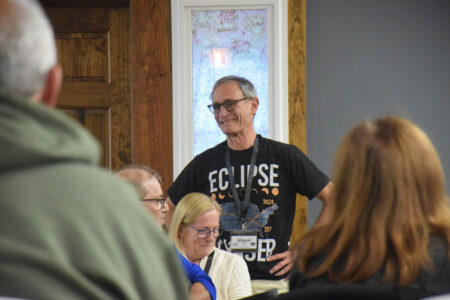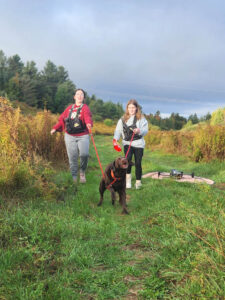Taking a break
Voucher program offers up to $600 for caregivers to seek respite
TUPPER LAKE — Colleen Salisbury, a North Country community outreach coordinator for Lifespan of Greater Rochester, a nonprofit focused on aging services, spoke at last week’s Tupper Lake Village Board meeting.
She was there to spread awareness about a voucher program that helps caregivers pay for respite — a break from caring for someone close to them. While the nonprofit is based in Rochester, the program is open for residents throughout the state.
It offers up $600 for caregivers to put toward hiring someone to care for their loved one so that they can temporarily relieve themselves of the responsibilities, which can be taxing. The program is open to both kinship caregivers looking after a child under 18 and caregivers of adults and children with a long-term chronic condition, according to its website. It’s administered through the New York State Caregiving and Respite Coalition, which is managed by Lifespan of Greater Rochester.
“I have seen a tremendous increase in caregivers who have reached out to me when they heard about it — and they just love it,” she said. “Because it helps them. It helps them reduce their stress and basically just get a break because a lot of them are really stressed out.”
Salisbury explained that the hired caregiver that this voucher could cover doesn’t need to be a medical professional, though the application notes that the hiree cannot live in the same house as the applicant or care recipient.
“(Applicants) can identify a care provider,” she said. “It could be someone you trust — it doesn’t have to be a nurse or anything — because we’re basically looking at someone who’s a companion who’s going to hang out in the house while you get your break.”
Rebecca Hyde, who works for Lifespan of Greater Rochester to administer parts of the program and review applications, noted that professional caregivers can be hard to come by, especially in rural areas. She said many who have received these vouchers have hired a friend or family member — provided they don’t live under the same roof.
Hyde added that the program’s flexibility — which extends to the number of hours they can hire for and the pay rate — is one of people’s favorite parts about it.
Salisbury said she’s received a lot of positive feedback on the program since she began advocating for it last November, and plans to keep pushing for it to be continued. She met with state Assemblyman D. Billy Jones, D-Chateaugay Lake, and state Senator Dan Stec, R-Queensbury, to lobby for their support.
The voucher program receives a portion of its funding from the U.S. Department of Health and Human Services. Federal funding cuts have put the program in limbo, and its website notes that voucher applicants will be placed on a waitlist, though people are still encouraged to apply.
Hyde said that the program is still reviewing applications and vouchers are still being disbursed.
“There’s a little bit of uncertainty around federal funding,” she said. “Right now, this program is solid but we are giving people a little bit of a heads up that there is a waitlist.”
Hyde said that applicants are usually notified within a week that their paperwork has been received and to provide a status update, though it can occasionally take a bit longer if processors are reviewing a higher volume of applications.
The program requires the caregiver to apply, not a person receiving care or someone else familiar with their situation.
“We’re really dedicated to the family caregiver,” she said. “So when people apply, I need to make sure that it’s the caregiver applying for themselves to get respite.”
There are no income restrictions to this voucher program, though applicants cannot apply for this voucher if they are currently receiving financial assistance for respite from another program.
“We’re really looking for folks who are slipping through the cracks and aren’t eligible for other programs,” she said.
The application requires a reference. Hyde said that this doesn’t have to be a formal letter, but should be contact information for a professional, such as a doctor, social worker or pastor, who can confirm the situation of the caregiver and the person they’re looking after.
“If you’re running into people in the community and you’re like, ‘I know these people are constantly helping their loved one and they could use a break, maybe, talk to them and reach out to me and we can try to help them,” Salisbury said.
More information and an application for the voucher can be found at tinyurl.com/yw8t6ae7. If people have questions, they can submit those online or email rhyde@lifespan-roch.org.



